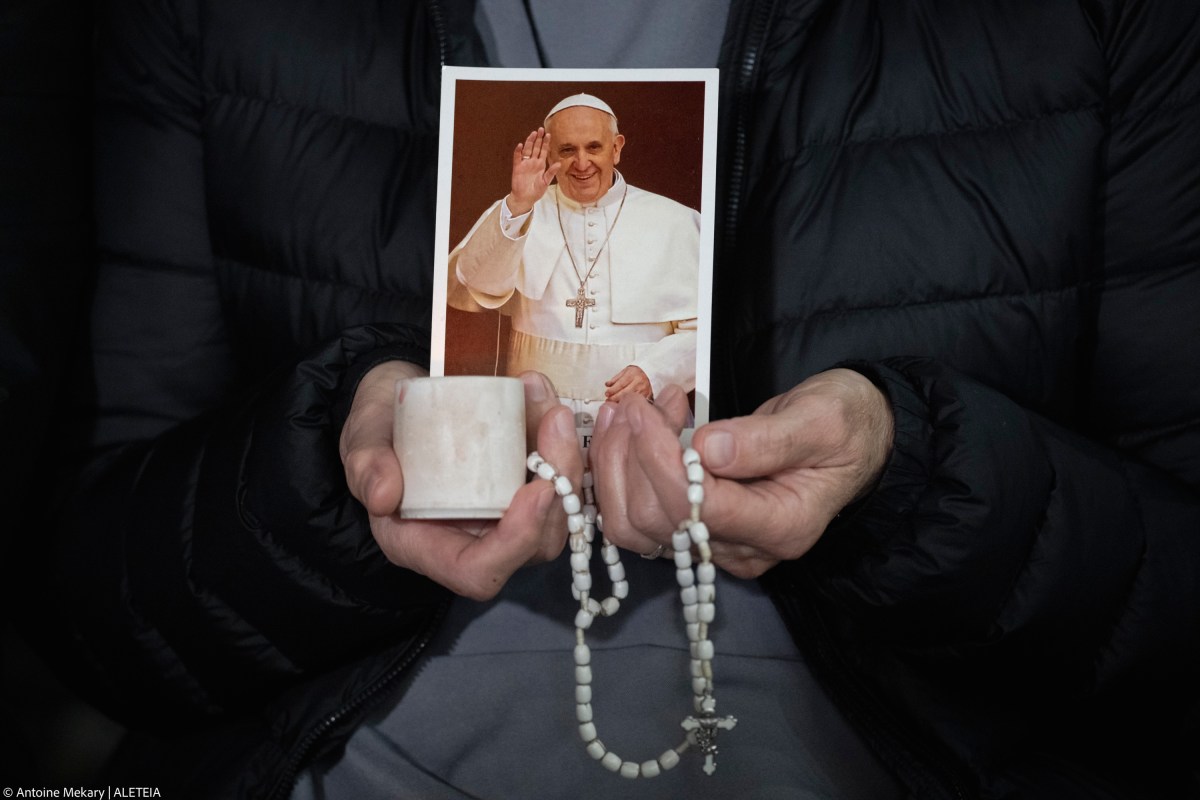Lenten Campaign 2025
This content is free of charge, as are all our articles.
Support us with a donation that is tax-deductible and enable us to continue to reach millions of readers.
As the son of St. Ignatius that he is, Pope Francis is an adamant advocate of self-awareness. The examen is a key part of the legacy of the Jesuit founder, and our first Jesuit pope has promoted it countless times. He warns against the dangers of not knowing what is happening in our hearts and psyches, of not realizing what motivates or disillusions us.
This self-awareness and all that it implies gives a certain strength, the Pope suggests.
And it was something of that strength, forged over his 88 years, that came to the Pope's aid during his near-death experiences in the hospital.
In the interview with Italian daily Corriere della Sera (in an article published on March 25, 2025), Doctor Sergio Alfieri spoke of the Pope's "consapevolezza" -- his awareness that he had nearly died, of all that was happening around him -- as "also the reason that kept him alive."
The journalist asked for clarification, and the doctor replied:
“In the past, when we spoke I asked him how he manages to keep up this pace and he always replied: 'I have a method and a routine.' Apart from having a very strong heart, he has incredible resources. I think the fact that the whole world was praying for him also contributed to this.”
What is this method and these resources?
At the end of the Pope's catechesis series on discernment in 2022, he observed:
Life always presents choices to us, and if we do not make conscious choices, in the end it is life that chooses for us, taking us where we do not want to go.
Is this consciousness, this self-awareness, one of his resources? Is this part of his "method and routine"? Surely it is. Once he explained:
I try to look inside myself once or twice a day. To look at the things I felt during the day, the things that happened inside me. [...] But my complete concrete image [of myself] is something I find day by day looking at how I behave, the decisions I make, the mistakes I make … and it’s an image that progresses, as life progresses.
One can imagine that decades and decades of self-awareness, of finding the work of God in our daily lives, give the Pope a serenity and strength to confront even a moment of near-death, at a level that many patients would not have.
In May of 2018, the Pope gave a homily where he reflected on St. Paul's awareness that he was approaching death, an awareness that came from his discernment and examen. The Apostle said, "I know that none of you to whom I preached the kingdom during my travels will ever see my face again.”
Francis linked St. Paul's leave-taking to his own ... and to his examen of conscience.
“When I read this,” Francis said, “I think of myself. Because I am a bishop and I must say good-bye.”
“I ask the Lord the grace to be able to say goodbye like [Paul did.] In my examen of conscience, I won’t be a conqueror like Paul was, but the Lord is good, he is merciful [...] May the Lord give to all of us the grace of being able to take our leave like this, with this spirit, with this strength, with this love for Jesus Christ, and with this confidence in the Holy Spirit.”
And what about the prayers of the faithful?
At the same time, it is interesting how the doctor noted the prayers of the Church, of the faithful people of God around the world.
Certainly the whole Church mobilized in prayer during the days of the Pope's hospitalization. Notably, for many days, a nightly Rosary was held at the Vatican, led the first several days by cardinals, and then by other Church leaders.
Dr. Alfieri said, "I think the fact that the whole world was praying for him also contributed to this.”
The journalist naturally asked the doctor to clarify what made him think that: because he's a believer? Because he's a doctor and scientist?
"Are you saying this as a believer?" the journalist asked.
“There is a scientific publication that says that prayers give strength to the sick; in this case the whole world started to pray," he answered.
For the Church, there is the understanding that the whole force of both prayer and science can -- should -- be put to work in response to health crises. Then when the Church examines miracles attributed to saints in the processes of canonizations, it has to show that something beyond the good effects of medical technology has occurred.
For his part, Doctor Alfieri discounted neither the prayer nor the health care.
"A miracle happened"
The doctor said:
"I can say that twice the situation was lost and then a miracle happened. Of course, he was a very cooperative patient. He underwent all the therapies without ever complaining."












